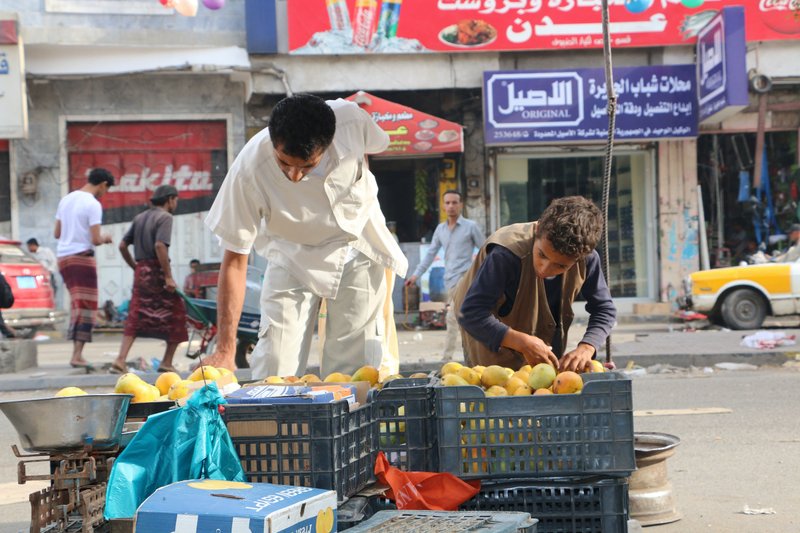SANAA, Yemen -- Saudi-led coalition airstrikes targeting Shiite rebels have resumed in the southern port city of Aden after the end of a five-day humanitarian cease-fire, Yemeni security officials and witnesses said early today.
The cease-fire expired at 11 p.m. Sunday, and coalition airstrikes hit rebel positions and tanks in several neighborhoods of Aden, the officials said. The officials spoke on condition of anonymity because they were not authorized to speak to the media, and the witnesses requested anonymity because they feared reprisals.
The cease-fire hadn't halted all fighting in Yemen between the Shiite rebels, known as Houthis, and those opposing them.
Earlier Sunday, hundreds of Yemeni politicians and tribal leaders began talks in Saudi Arabia on the future of their war-torn country, though the Houthis were not taking part.
The Houthis have rejected the main aim of the three-day talks -- the restoration of Yemen's exiled president -- and the location of the negotiations in Saudi Arabia. The absence of the Houthis means the national dialogue is unlikely to end the violence, which saw the rebels seize the capital, Sanaa, in September and ultimately force President Abed Rabbo Mansour Hadi into exile.
The United Nations envoy to Yemen, Ismail Ould Cheikh Ahmed, opened the meeting in Riyadh on Sunday by calling on all parties to ensure that the shaky cease-fire leads to a lasting truce.
"I call on all parties to refrain from any action that disturbs the peace of airports, main areas and the infrastructure of transport," said Ahmed, who delivered the speech on behalf of U.N. Secretary-General Ban Ki-moon.
Since late March, Saudi Arabia has led airstrikes against the Houthis and allied military units loyal to former President Ali Abdullah Saleh. The air campaign is aimed at weakening the Houthis and restoring Hadi, who fled the country in March in the face of a rebel advance.
"This conference taking place today is in support of politics and community and rejects the coup," Hadi told the gathering.
He urged a return to the political road map through which Saleh stepped down after more than three decades in power after a 2011 Arab Spring-inspired uprising. Saleh's ouster and the road map was backed and overseen by the six-nation Gulf Cooperation Council, which is headquartered in Saudi Arabia, as well as the U.N. and the U.S.
Hadi called on Yemenis to be patient, saying a growing number are being displaced. Yemeni parliament member Abdulaziz al-Jubari labeled the meeting a "peace conference."
"We call upon all parties involved in this war to return to their senses before it's too late," al-Jubari said in a speech.
Among those taking part in the conference were members of Saleh's former ruling party.
Ahmed said the U.N. will arrange another conference soon that involves all political parties in Yemen.
Yemen's conflict has killed more than 1,400 people -- many of them civilians -- since March 19, according to the U.N. The country of some 25 million people has endured shortages of food, water, medicine and electricity as a result of a Saudi-led blockade. Humanitarian organizations had been scrambling to distribute aid before the end of the truce.
That includes an Iranian cargo ship carrying humanitarian aid en route to Yemen. Iranian state television quoted Nasser Charkhsaz, the head of the Iranian Red Crescent's Relief and Rescue Organization, as saying that the ship is currently sailing in international waters near Oman's Salalah port.
Iran's navy has vowed to protect the vessel, and the government said it won't allow any country that's part of Yemen's war to inspect the cargo. The vessel will arrive at Yemen's Red Sea port of Hodeida on Thursday, according to a state TV reporter on board.
The aid ship, which left Iran's southern port of Bandar Abbas on May 11, is carrying about 2,400 tons of food and 100 tons of medical aid, Fars news agency reported. Doctors, aid workers and journalists are also on board.
Alaeddin Boroujerdi, head of the Iranian parliament's national security and foreign policy committee, said an agreement with the U.N. allows the ship to dock at Hodeida. That conflicts with a letter to the U.N. from Yemen's government-in-exile, which, according to Saudi-owned Al Arabiya television, said all aid must be coordinated with the Saudi-led coalition.
"Neither Saudi Arabia nor any of the countries belonging to the coalition have the right to inspect the Iranian ship," Boroujerdi said.
The voyage is a direct challenge to the Saudi-led blockade and comes as Saudi Arabia and Iran vie for regional dominance. A confrontation near the Suez Canal and key oil transit routes would further destabilize a region rocked by conflicts from Iraq to Syria and Libya.
"There is the potential for this ship to push the conflict to another level," Ibrahim Sharqieh, deputy director of the Brookings Doha Center, said by phone.
Western countries accuse Shiite power Iran of backing the Houthi rebels, something the Islamic Republic and the rebels deny.
Saudi Arabia assembled a coalition of Sunni-ruled nations in March to bomb the Houthis after the group ousted Hadi, who is backed by the six-nation Gulf Cooperation Council.
Meanwhile, a suspected U.S. drone strike hit a car carrying a group of people believed to be al-Qaida fighters, Yemeni security officials said. The strike was in Shabwa province, where the extremist group has sent reinforcements. The officials spoke on condition of anonymity because they were not authorized to speak to reporters.
Information for this article was contributed by Ahmed al-Haj of The Associated Press and by Ladane Nasseri, Nafeesa Syeed, Deema Almashabi and Mohammed Hatem of Bloomberg News.
A Section on 05/18/2015


